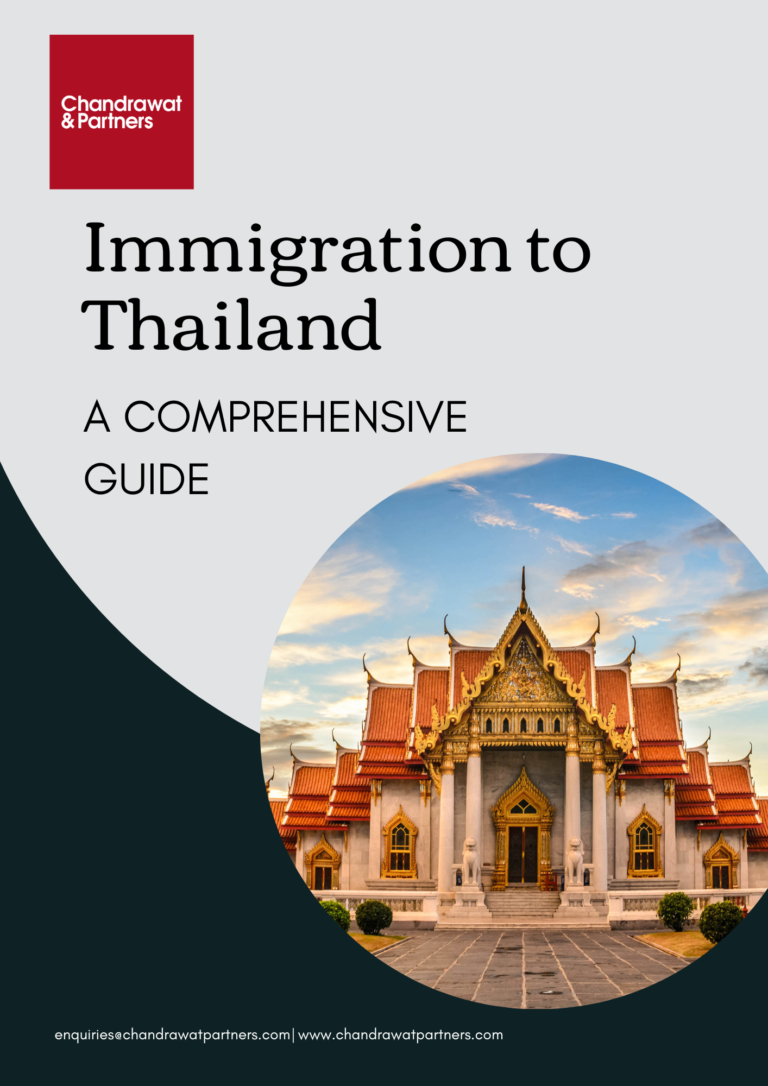We have a team of professionals to help you with all your business needs. So, that you can focus on business expansion in Thailand.
Please feel free to email us on [email protected]
Thailand
Why Thailand?
Thailand, known as the ‘land of smiles’, is renowned for its welcoming, open culture. Its location in the heart of Asia, low cost of living and government incentives make it a desirable destination for business.Located in the centre of mainland Southeast Asia, Thailand is a middle power in global affair. Being a founding member of ASEAN it holds a high Human Development Index.
It has been classified as a newly industrialized economy with manufacturing, agriculture, and tourism as leading sectors. As per the U.S. News & World Best Countries report 2020 edition, Thailand was rated as the 26th best country overall, wherein 73 countries evaluated on the basis of quality of life, economic influence, power, education, and eco friendliness, among others. Thailand has performed phenomenally year by year in multiple areas.
Its economy is heavily dependent on its tourist industry and visitors from across the world to enjoy the country’s idyllic beaches and experience its culture.
Advantages
Thailand has always been one of the most attractive spots for business not only among the ASEAN countries but also for the entire Asia continent. Doing business in Thailand offers the following advantages:
Open and Welcoming Economy
Thai society, particularly its business community, is very favorable to foreign investment and companies wishing to establish their offices in the country. Organizations doing business in Thailand will find the infrastructure and systems ready for them to begin operating successfully.
Diverse Manufacturing Sector
With a large and very active manufacturing sector, Thailand produces a diverse array of goods including toys, fish products, rubber, furniture, and jewelry. The strengths in manufacturing Fast-moving consumer goods (FMCGs) have led Thailand to become a regional leader in trade and commerce.
Pro-Active Government Policies
The Thai government is a forward-thinking and innovative body that actively encourages development and socio-economic advancement. Foreign investment, both financially and in the local workforce, is strongly encouraged by Thai authorities whereby the government’s policies have made the more inviting environment for foreign businesses and organizations.
A Large, Adoptable, and Cost-Efficient Workforce
Thailand has a large and adaptable workforce. As per Thailand’s Board of Investment, literacy rates reach 94% for men and 90% for women, so foreign investors will find an intelligent workforce with the potential for further development. In addition to being flexible and educated, the Thai workforce is also among the most cost-efficient in the region in terms of pay with the average daily wage for Bangkok being 203 THB.
Simple Tax Regime
Corporate Taxes
Any company incorporated in Thailand is taxed on worldwide income wherein a company incorporated abroad is taxed on its profits arising from or in consequence of the business carried on in Thailand. The Standard Corporate Income Tax (CIT) rate is 20%.
Generally, the tax year in Thailand is for the 12-month period ending on 31 December. However, a company is free to choose any accounting period for the financial year as per their company incorporation date. If any company wanted to change its accounting period, it can be changed upon written approval of the Revenue Department. Foreign companies, not carrying on business in Thailand are subject to a Final Withholding Tax (WHT) on certain types of assessable income, such as; interest, dividends, royalties, rentals, and service fees paid from or in Thailand.
The tax rate for companies with low paid-in capital and income
Companies and juristic partnerships with paid-in capital not exceeding 5 million Thai Baht (THB) and income from the sale of goods or services not exceeding THB 30 million are subject to tax at the following rates:
- From 0 to 300,000 THB, liable to tax at the rate of 0%;
- From 300,001 to 3 million THB, liable to tax at the rate of 15%; and
- Over 3 million THB, liable to tax at the rate of 20%.
Individual Taxes
In Thailand, tax rates vary on the basis of personal income in ex-pat taxes and are progressive in nature. Residents and non-residents are liable to tax on their assessable income derived from employment or business carried on in Thailand, regardless of whether paid on or outside Thailand. Residents who derive income from abroad are taxable on that income if remitted into Thailand in the year in which it is received. Personal taxes are levied as per the following rates:
- Income from 0 to 150,000 THB is exempted from the tax;
- Income from 150,001 to 300,000 THB is liable to tax at the rate of 5%;
- Income from 300,001 to 500,000 THB is liable to tax at the rate of 10%;
- Income from 500,001 to 750,000 THB is liable to tax at the rate of 15%;
- Income from 750,001 to 1,000,000 THB is liable to taxed at the rate of 20%;
- Income from 1,000,001 to 2,000,000 THB is liable to taxed at the rate of 25%;
- Income from 2,000,001 to 5,000,000 THB is liable to taxed at the rate of 30%;
- Over 5,000,000 THB is liable to taxed at the rate of 35%.
Thailand Companies
Thailand is one of the most attractive investment destinations for foreign investors. When doing business in Thailand, people have the following options to establish businesses:
Partnership
Partnerships are divided into three types:
- Unregistered Ordinary Partnerships: Ordinary partnerships may or may not register as a legal entity. This type of partnership has no status as a legal entity and all partners have joint, unlimited liability for all the partnership’s
- Registered Ordinary Partnerships: Registered partnership becomes a legal entity, and their liability for obligations may be enforced first against the legal It is separate and distinct from the individual partners.
- Limited partnerships: Limited partnerships must be registered and have two kinds of liability:
- Limited liability partnerships, whose liability is limited to their limited partners’ respective contributions, and
- Unlimited liability partnerships, whose partners have joint, unlimited liability for the partnership’s obligation.
Limited Company
In Thailand, there are two types of limited companies:
- Private Companies, governed by the Civil and Commercial Code,
- Public companies, governed by the Public Company
Joint Ventures
In Thailand, a joint venture is formed by a contractual arrangement among two or more people or legal entities. It must be registered at the Revenue Department and is considered a single entity for taxation purposes.
In Thailand, some other entities may also be formed based on the regulations found in the Civil and Commercial Code of Thailand. These other forms of corporate presence are:
Branch of a Foreign Company
Foreign firms may carry out certain businesses through a branch office, which is required to maintain accounts only relating to the branch in Thailand.
Regional Office
A regional office is similar to a representative office. It must obtain a license under the Foreign Business Act,1999, and is limited in its permitted activities.
Representative Office
A representative office is an office in Thailand by a foreign company engaged in international trading, but it cannot engage in any profit-making enterprise. The scope of activities of a representative office is limited to certain approved activities.
As per the U.S. News & World Best Countries report 2020 edition, Thailand rated as the 26th best country overall, wherein 73 countries evaluated on the basis of quality of life, economic influence, power, education, and eco friendliness, among others. Thailand has performed phenomenally year by year in multiple areas.
Author: Chandrawat & Partners
Topic: Doing Business in Thailand
Contact Us
Get in touch with the right people to get the right help in setting up your business in Thailand.
Contact us at: [email protected]
Thailand
We have a team of professionals to help you with all your business needs. So, that you can focus on business expansion in Thailand.
WHY THAILAND?
Thailand, known as the ‘land of smiles’, is renowned for its welcoming, open culture. Its location in the heart of Asia, low cost of living and government incentives make it a desirable destination for business. Located in the centre of mainland Southeast Asia, Thailand is a middle power in global affair. Being a founding member of ASEAN it holds a high Human Development Index.
It has been classified as a newly industrialized economy with manufacturing, agriculture, and tourism as leading sectors. As per the U.S. News & World Best Countries report 2020 edition, Thailand was rated as the 26th best country overall, wherein 73 countries evaluated on the basis of quality of life, economic influence, power, education, and eco friendliness, among others. Thailand has performed phenomenally year by year in multiple areas.
Its economy is heavily dependent on its tourist industry and visitors from across the world to enjoy the country’s idyllic beaches and experience its culture.

ADVANTAGES
Thailand has consistently been one of the most alluring destinations for business, not just in ASEAN but across Asia. The following benefits come with conducting business in Thailand:
A Welcoming and Open Economy
Thai society, especially its business sector, is very welcoming to foreign businesses and investors that want to open offices there. In Thailand, businesses will find the processes and infrastructure they need to start functioning effectively.
Diverse Manufacturing Sector
Thailand has a sizable and highly active manufacturing sector that produces a wide range of commodities, such as jewellery, toys, fish products, rubber, and furniture. Thailand has emerged as a regional leader in trade and commerce due s to its expertise in the production of fast-moving consumer goods (FMCGs).
Pro-Active Government Policies
The Thai government is a creative and progressive, and actively promotes growth and socio-economic progress. Thai authorities avidly encourage foreign investment, both in cash and in local labour, and their policies have created a more welcoming atmosphere for international companies and organizations.
A Large, Adaptable, and Economical Workforce
Thailand's workforce is large and flexible. According to Thailand's Board of Investment, 90% of women and 94% of men are literate, thus international investors will find a workforce that is intelligent and has room to grow. The average daily wage in Bangkok is 203 THB, making Thai workers not only highly educated and adaptable but also among the most cost-effective in the region.

The tax rate for companies with low paid-in capital and income
Companies and juristic partnerships with paid-in capital not exceeding 5 million Thai Baht (THB) and income from the sale of goods or services not exceeding THB 30 million are subject to tax at the following rates:
- From 0 to 300,000 THB, liable to tax at the rate of 0%;
- From 300,001 to 3 million THB, liable to tax at the rate of 15%; and
- Over 3 million THB, liable to tax at the rate of 20%.
Individual Taxes
In Thailand, tax rates vary on the basis of personal income in ex-pat taxes and are progressive in nature. Residents and non-residents are liable to tax on their assessable income derived from employment or business carried on in Thailand, regardless of whether paid on or outside Thailand. Residents who derive income from abroad are taxable on that income if remitted into Thailand in the year in which it is received. Personal taxes are levied as per the following rates:
- Income from 0 to 150,000 THB is exempted from the tax;
- Income from 150,001 to 300,000 THB is liable to tax at the rate of 5%;
- Income from 300,001 to 500,000 THB is liable to tax at the rate of 10%;
- Income from 500,001 to 750,000 THB is liable to tax at the rate of 15%;
- Income from 750,001 to 1,000,000 THB is liable to taxed at the rate of 20%;
- Income from 1,000,001 to 2,000,000 THB is liable to taxed at the rate of 25%;
- Income from 2,000,001 to 5,000,000 THB is liable to taxed at the rate of 30%;
- Over 5,000,000 THB is liable to taxed at the rate of 35%.
SIMPLE TAX REGIME
Corporate Taxes
Any company incorporated in Thailand is taxed on worldwide income wherein a company incorporated abroad is taxed on its profits arising from or in consequence of the business carried on in Thailand. The Standard Corporate Income Tax (CIT) rate is 20%.
Generally, the tax year in Thailand is for the 12-month period ending on 31 December. However, a company is free to choose any accounting period for the financial year as per their company incorporation date. If any company wanted to change its accounting period, it can be changed upon written approval of the Revenue Department. Foreign companies, not carrying on business in Thailand are subject to a Final Withholding Tax (WHT) on certain types of assessable income, such as; interest, dividends, royalties, rentals, and service fees paid from or in Thailand.

The tax rate for companies with low paid-in capital and income
Companies and juristic partnerships with paid-in capital not exceeding 5 million Thai Baht (THB) and income from the sale of goods or services not exceeding THB 30 million are subject to tax at the following rates:
- From 0 to 300,000 THB, liable to tax at the rate of 0%;
- From 300,001 to 3 million THB, liable to tax at the rate of 15%; and
- Over 3 million THB, liable to tax at the rate of 20%.
Individual Taxes
In Thailand, tax rates vary on the basis of personal income in ex-pat taxes and are progressive in nature. Residents and non-residents are liable to tax on their assessable income derived from employment or business carried on in Thailand, regardless of whether paid on or outside Thailand. Residents who derive income from abroad are taxable on that income if remitted into Thailand in the year in which it is received. Personal taxes are levied as per the following rates:
- Income from 0 to 150,000 THB is exempted from the tax;
- Income from 150,001 to 300,000 THB is liable to tax at the rate of 5%;
- Income from 300,001 to 500,000 THB is liable to tax at the rate of 10%;
- Income from 500,001 to 750,000 THB is liable to tax at the rate of 15%;
- Income from 750,001 to 1,000,000 THB is liable to taxed at the rate of 20%;
- Income from 1,000,001 to 2,000,000 THB is liable to taxed at the rate of 25%;
- Income from 2,000,001 to 5,000,000 THB is liable to taxed at the rate of 30%;
- Over 5,000,000 THB is liable to taxed at the rate of 35%.
THAILAND COMPANIES
Thailand is one of the most attractive investment destinations for foreign investors. When doing business in Thailand, people have the following options to establish businesses:
Partnership
Partnerships are divided into three types:
- Unregistered Ordinary Partnerships: Ordinary partnerships may or may not register as a legal entity. This type of partnership has no status as a legal entity and all partners have joint, unlimited liability for all the partnership’s
- Registered Ordinary Partnerships: Registered partnership becomes a legal entity, and their liability for obligations may be enforced first against the legal It is separate and distinct from the individual partners.
- Limited partnerships: Limited partnerships must be registered and have two kinds of liability:
- Limited liability partnerships, whose liability is limited to their limited partners’ respective contributions, and
- Unlimited liability partnerships, whose partners have joint, unlimited liability for the partnership’s obligation.
Limited Company
In Thailand, there are two types of limited companies:
- Private Companies, governed by the Civil and Commercial Code,
- Public companies, governed by the Public Company

Joint Ventures
In Thailand, a joint venture is formed by a contractual arrangement among two or more people or legal entities. It must be registered at the Revenue Department and is considered a single entity for taxation purposes.
In Thailand, some other entities may also be formed based on the regulations found in the Civil and Commercial Code of Thailand. These other forms of corporate presence are:
Branch of a Foreign Company
Foreign firms may carry out certain businesses through a branch office, which is required to maintain accounts only relating to the branch in Thailand.

Regional Office
A regional office is similar to a representative office. It must obtain a license under the Foreign Business Act,1999, and is limited in its permitted activities.
Representative Office
A representative office is an office in Thailand by a foreign company engaged in international trading, but it cannot engage in any profit-making enterprise. The scope of activities of a representative office is limited to certain approved activities.





